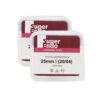Super Endo Finishing Files 20/04 25mm Pack of 6
- Brand: SuperEndo
-
( 6 Reviews )Rated 5.00 out of 5 based on 6 customer ratings06
US$24.00US$40.00 (-40%)
In stock

Super Endo Finishing Files 20/04 25mm Pack of 6
SuperEndo Finishing Files 20/04 Efficiently cleans the canal walls and extracts the residual canal debris from the canal. The unique offset flute design of the Finishing File enables the file to agitate sodium hypochlorite and remove remaining dentinal wall debris without further enlarging the canal. The plastic rotary finishing file – the most cost effective and simplest way to clean a canal – is intended for single use. The Finishing File is used as the last file prior to obturation of a canal. It replaces the use of sonic or ultrasonic instrumentation.
No matter which endodontic File systema clinician chooses to incorporate into their conventional endodontic treatment in conjunction with sodium hypochlorite (NaOCL) and EDTA (ethylenediaminetetracitic acid) usage, there will always be some canal debris left on the dentinal walls.’ The main reasons for this are first, NiTi files stay centered in the canal and thuS will not contact walls that have various invaginations or irregularities. Second, canal morphology can be complex making it difficult for the chemical-mechanical canal preparation to be effective in removing all the canal debris. Although the use of sonic or ultrasonic instrumentation is effective in removing residual canal debris that rotary endodontic files leave behind, and irrigation solutions are often unable to remove it during endodontic treatment.” Many clinicians still do not incorporate it into their endodontic treatment technique. The common reasons given for not using sonic or ultrasonic canal cleaning are:
- It can be time Consuming to set up.
- A dentist is not willing to incur the cost for the additional equipment. 3. A clinician is not aware of the benefits to this important final instrumentation step in endodontic treatment.
It is for these reasons that the plastic endodontic rotary Finishing File is on the market. This single-use, plastic rotary file has a unique offset flute design, made of non-toxic polymer will remove residual dentinal wall debris and agitate sodium hypochlorite without further enlarging the canal.
Features :-
- Its made of plastic polymer (non toxic). Single Use File.
- Effective chemo mechanical cleaning.
- It saves time. Easy to use.
- The Finishing File provides time and cost savings
over sonic or ultrasonic instrumentation. - Efficiently cleans the canal walls and extracts
the residual canal debris from the canal. - The unique offset flute design of the Finishing File enables
the file to agitate sodium hypochlorite and remove remaining9
dentinal wall debris without further enlarging the canal.
Key Specifications :-
- Size: 20
- Taper: 0.04mm
- Available Lengths: 25mm
- Single-Use Only
- Parallel offset flute design for maximumn
agitation and debris removal
Packaging :-
- 1 X Pack Of 6 Finishing Files
Direction to Use :-
FINISHING FILE CLINICAL TECHNIQUE
- The Finishing File should be the last file used in a canal before obturation.
- Prior to placement of the finishing file, the canal should be filled with sodium hypochlorite.
- The finishing file is inserted in an electric slow speed handpiece that is set from 700-900 rpm.
- The working length is set on the finishing file with a rubber stopper,
then placed passively in to the canal and circumferentially worked
along the dentinal walls with cyclic axial (up and down) motion. - The finishing file should be Used in the canal for approximately 30
seconds, then the canal is flushed with sodium hypochlorite and
dried for obturation or placement of an intracanal medicant. - The finishing file is single usage per tooth and should be properly discarded after use.
Caution: It is important not to bind the Finishing File in a canal. This may cause a torsional stress fracture of the file. If file does break, simply take a heated element and remove.
FAQs :-
Q. These Finishing Files are made up of which material ?
A. Superendo Finishing Files are made up of plastic polymer (non toxic).
Q. What is the recommended speed to use these files ?
A. The finishing file is inserted in an electric slow speed handpiece that is set from 700-900 rpm.
Q. Are these files reusable ?
A. These finishing file is single usage per tooth and should be properly discarded after use
Average Rating
5.00
Only logged in customers who have purchased this product may leave a review.
















by Helene Hewitt
pleased to shop from your website. keep it up